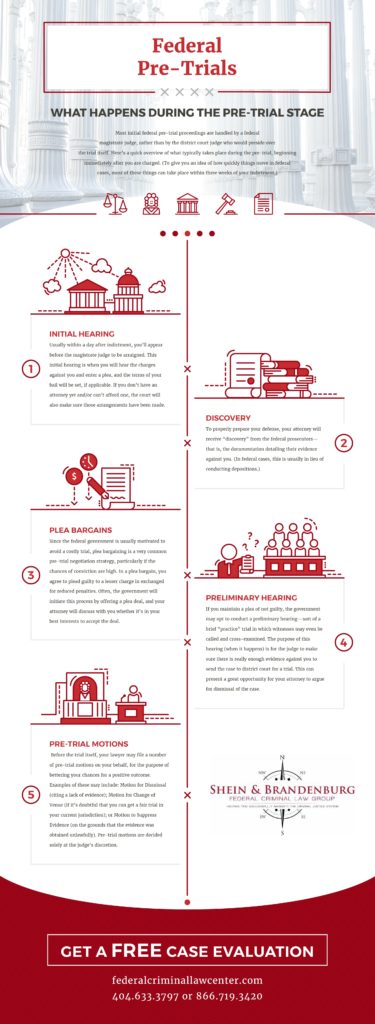If you’ve been accused of a federal crime, it’s important to hire a criminal defense attorney with experience in federal pre-trials. In federal cases, what happens before the trial can have a huge impact on what happens during the trial, and in many instances can avert a trial altogether.
Why The Pre-Trial Stage Is Important

The term “pre-trial” is often used to describe the time frame between when you are formally charged with a crime and when your case is brought to trial. In federal cases, this window of time is often shorter than in state cases because the U.S. Attorneys have often conducted extensive investigations for months or years beforehand, and in felony cases have even secured a grand jury indictment—which means they are already reasonably certain they can convict you if the case goes to court. This is why it’s so important to have an attorney who knows what to do during federal pre-trials: your attorney’s swift and strategic actions during this time frame can greatly increase your chances for a positive outcome.
Overview of Federal Pre-Trials
Once you’ve been formally charged with a federal crime (usually by indictment), the pre-trial stage begins. Ironically, during this time, your attorney and the prosecuting attorney(s) usually share the same goal: to keep the case from going to trial. You want to avoid harsh fines, penalties and prison time; the federal government wants to avoid the time and expense of prosecuting your case in court. A skilled defense attorney knows how to use this to your best advantage by implementing a number of pre-trial strategies, ranging from negotiating for mitigated charges to exclusion of evidence. Averting a trial doesn’t always mean the charges are dropped (although sometimes it does), but it frequently means your penalties can be significantly lower than if you were convicted in court.
What Happens During The Pre-trial Stage
Most initial federal pre-trial proceedings are handled by a federal magistrate judge, rather than by the district court judge who would preside over the trial itself. Here’s a quick overview of what typically takes place during the pre-trial, beginning immediately after you are charged. (To give you an idea of how quickly things move in federal cases, most of these things can take place within three weeks of your indictment.)
- Initial hearing. Usually within a day after indictment, you’ll appear before the magistrate judge to be arraigned. This initial hearing is when you will hear the charges against you and enter a plea, and the terms of your bail will be set, if applicable. If you don’t have an attorney yet and/or can’t afford one, the court will also make sure those arrangements have been made.
- Discovery. To properly prepare your defense, your attorney will receive “discovery” from the federal prosecutors—that is, the documentation detailing their evidence against you. (In federal cases, this is usually in lieu of conducting depositions.)
- Plea bargains. Since the federal government is usually motivated to avoid a costly trial, plea bargaining is a very common pre-trial negotiation strategy, particularly if the chances of conviction are high. In a plea bargain, you agree to plead guilty to a lesser charge in exchanged for reduced penalties. Often, the government will initiate this process by offering a plea deal, and your attorney will discuss with you whether it’s in your best interests to accept the deal.
- Preliminary hearing. If you maintain a plea of not guilty, the government may opt to conduct a preliminary hearing—sort of a brief “practice” trial in which witnesses may even be called and cross-examined. The purpose of this hearing (when it happens) is for the judge to make sure there is really enough evidence against you to send the case to district court for a trial. This can present a great opportunity for your attorney to argue for dismissal of the case.
- Pre-trial Motions. Before the trial itself, your lawyer may file a number of pre-trial motions on your behalf, for the purpose of bettering your chances for a positive outcome. Examples of these may include: Motion for Dismissal (citing a lack of evidence); Motion for Change of Venue (if it’s doubtful that you can get a fair trial in your current jurisdiction); or Motion to Suppress Evidence (on the grounds that the evidence was obtained unlawfully). Pre-trial motions are decided solely at the judge’s discretion.
Our Experience With Federal Pre-Trials
The more experienced your attorney is with pre-trial proceedings and negotiations, the greater your odds for a more positive outcome for your case. Attorney Marcia Shein has extensive experience and an excellent track record with federal pre-trials, having represented clients in many federal court districts throughout the Southeast.

